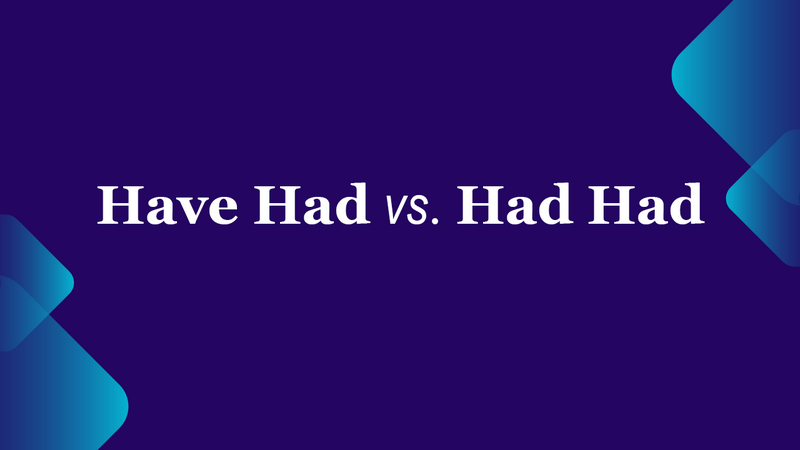Today, we’re looking at how to use “I have had” and “I had had.”
Present Perfect Tense: “I Have Had”
“I have had” is in the present perfect tense. To form the present perfect tense, we use the structure Subject + have/has + past participle (verb 3).
Examples:
✅ I have eaten breakfast.
✅ I have taken a shower.
There are several reasons why we use the present perfect tense; however, I’m not going to explain all of them in this article. What’s important right now is that we often use the present perfect tense to talk about things that happened in the past without saying exactly when they happened.
When using the present perfect tense, we usually omit past time indicators such as “yesterday,” “last week,” “two days ago,” or “an hour ago.” Although we don’t mention past times when using present perfect, we can mention the time period in which something happened; however, this needs to be a time period that is still continuing right now, such as “today,” “this week,” “this month,” or “this year.”
❌ I have studied English yesterday (because “yesterday” is already finished and not continuing).
✅ I have studied this week (because “this week” is still continuing right now).
When to Use “Have Had”
As mentioned earlier, to make the present perfect tense, we use “have” or “has” and the third form of the verb. If we want to talk about having something, we need the third form of “have,” which is “had.” That is how we get “I have had.”
Interestingly, when referring to breakfast, “have” is often used instead of “eat.” Therefore, regarding the previous example about breakfast, both “I have eaten breakfast” and “I have had breakfast” mean the same thing.
Moreover, there’s also the basic meaning of “have” is for possession. For example, “I have two dogs” becomes “I have had two dogs” in the present perfect tense.
However, “I have had two dogs” isn’t true because I’ve actually had four dogs in my lifetime. I have two dogs right now, but I also had two other dogs when I was younger. Thus, throughout my entire life, including up to this moment, I have had four dogs.
Past Perfect Tense: “I Had Had”
From here, let’s look at “I had had,” which is the past perfect tense. “I had had” is very similar to “I have had,” but whereas “I have had” focuses on the present moment, “I had had” focuses on a specific point in the past.
Illustrating “Had Had” with My Personal Experiences
Let’s say that I got my first dog at age 10. That means that I had never had a dog at age 9. If we went back in time and asked the 9-year-old me about my dogs, the 9-year-old me would say, “I have never had a dog.” But here, right now, in the present, telling you this story about the past, I need to say, “When I was 9, I had never had a dog.”
Then, when I was 10, I got my first dog. If we went back in time and asked the 10-year-old me about my dogs, the 10-year-old me would say, “This is the only dog I have ever had.” But here, right now, in the present, telling you this story about the past, I need to say, “When I was 10, I had only ever had one dog.”
Then, when I was 16, I got another dog. So, the 16-year-old me would say that in my life, I have had two dogs. But here, right now, in the present, telling you this story about the past, I need to say that when I was 16, I had had two dogs. When I was 21, I got another dog, and just one year ago, I got one more dog. So, right now, I have two dogs. But in total, throughout my life, I have had four dogs.
Have Had or Had Had: Conclusion
Basically, “I have” means right now. “I have had” means both right now and before right now. “I had had” means at a specific point in the past and before that point.
One more example that’s really quick and simple: right now it’s 1 pm on Tuesday, and I have had lunch. That means I finished eating lunch sometime before right now. So, if someone invites me to have lunch with them, I will say, “Sorry, I have already had lunch.”
Tomorrow, Wednesday, if I want to talk about this, I can say, “Yesterday at 1 pm, I had already had lunch,” and that is why I didn’t go to lunch with Megan. “I had already had lunch” means I finished eating lunch sometime before that specific point in the past.
Sometimes, that specific point in the past is mentioned using the exact time in the past, and sometimes it’s mentioned using another past tense action. For example, instead of saying “at 1 pm yesterday,” we could say, “when Megan invited me to lunch, I had already eaten,” and that is why I declined her invitation.
If you still feel a little bit confused about this topic, that’s normal. This is not a simple topic, especially if you haven’t learned about the past perfect tense before.

